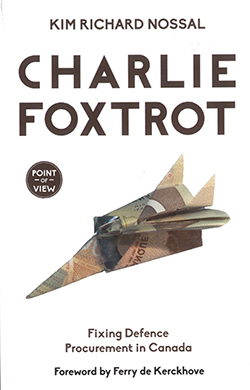Book Reviews

Charlie Foxtrot: Fixing Defence Procurement in Canada
by Kim Richard Nossal
Toronto: Dundurn, 2016
200 pages, $19.99 (paper)
ISBN-978-1-45973-675-7
For more information on accessing this file, please visit our help page.
Reviewed by Andrea Charron
The thought of wrestling with the dilemma that is defence procurement usually fills me with dread, not unlike a dental checkup – a necessary task but one I do not relish. Kim Richard Nossal’s book chronicling Canada’s defence procurement history, however, is very different. With arguably the best title for a policy book yet, Charlie Foxtrot, a euphemism for a “cluster f@ck” (a big mess), is very readable, full of useful, if not maddening anecdotes, and is dedicated to trying to find a solution to Canada’s defence buying woes.
In just 200 pages, Nossal first outlines the century worth of procurement “messes” before switching to a discussion of solutions aimed at politicians for the future. The acquisition melees include the Ross rifle, the CF-105 Arrow, the Iltis Jeep, the Victoria-class submarines, the Sea King helicopters and the F-35. Nossal’s analysis is remarkably even and reserved in tone given that these projects represent thousands of unnecessary and heartbreaking deaths of soldiers as well as millions of wasted taxpayer dollars. Successive Liberal and Conservative governments (the “principals”) are brought to task for numerous partisan decisions that have resulted, in most cases, in anything but the “right equipment, at the right time, in the right place with the right support at the right price.” The “agents” (or civil service) are shielded from criticism as is the public and this is where Nossal could have probed more deeply. While implied in several of the procurement problems, there is no overt mention made of the role of the defence industry, think tanks and the media that I include as part of the “public” that have specific agendas and are equally partisan.
Nossal focuses upon governments and oppositions to remind them of some unhelpful Canadian memes (what he refers to as distal causes) that persist and encourage acquisition disasters.
- Defence procurement is driven chiefly by the political need to spend as little as possible while at the same time expecting maximum economic spill over;
- Politicians are afforded a “permissive environment” (by the public) – there are few consequences for making the wrong decisions and few incentives to make the right decisions; and
- Canada insists it needs a “combat capable” military. (i.e. the military needs all manner of equipment and capabilities to fulfill multiple rather than niche roles).
The solutions proposed flow mainly from the first and third problem.
- If politicians often promise big acquisitions but then suffer from sticker shock, adjust procurement to spend on what must be done (the defence of Canada and North America) and depend on allies to provide collectively the other capabilities.
- Be more strategic (and one would add realistic) in terms of what Canada needs and have the Cabinet own the defence plan. Specifically, the defence white paper, which guides future procurement, needs to be understood, accepted, and ultimately spearheaded by the government, not the Department of National Defence.
- Don’t play politics with procurement.
Nossal is the first to admit that his solutions require a leap of faith, but he argues that they are vital if Canada is to end the Charlie Foxtrot that is Canadian defence procurement.
Of course, this book was written with the usual U.S. neighbour in mind – i.e., a relatively benign superpower that supports and defends Canada, and, most importantly, puts up with Canada’s procurement disasters. A Trump government may be less tolerant of this particular Canadian proclivity – no doubt communicating his displeasure in a tweet.
Most importantly, for academics, this book is a reminder of the importance of tenure and academic freedom. Few junior scholars would dare to dress down politicians as Nossal does, albeit more gently than is probably deserved, nor have many the scholastic clout of Nossal after years of dedication to teaching and rigorous study. Ultimately, this is a book that students, who may become future politicians, soldiers, and voting members of the public, will enjoy reading which might just prove to be the ultimate procurement solution.
Andrea Charron holds a Ph.D from the Royal Military College of Canada in War Studies. She obtained a Masters in International Relations from Webster University, Leiden, The Netherlands, a Masters of Public Administration from Dalhousie University, and a Bachelor of Science (Honours) from Queen’s University. Her research and teaching areas include NORAD, the Arctic, foreign and defence policy, and sanctions. She serves on the DND’s Defence Advisory Board, and has published in numerous peer-reviewed journals. Dr. Charron has worked for various federal departments, including the Privy Council Office in the Security and Intelligence Secretariat and the Canada Revenue Agency. She is currently Director of Carleton University’s Centre for Security, Intelligence, and Defence Studies and an Adjunct Professor at the Norman Patterson School of International Affairs.







